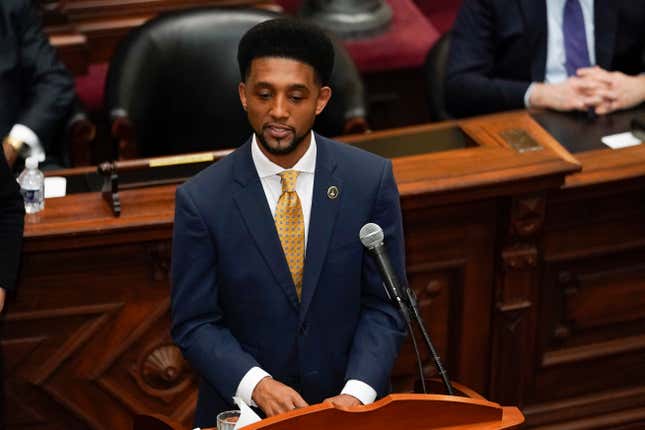
Some Baltimore residents aren’t happy that Mayor Brandon Scott, is again proposing a budget that would raise, not lower, funding for the city’s police department.
Scott was elected in 2019–during the height of the protest movement against police violence–in part on campaign pledges to fix a police department implicated in several scandals. Baltimore was the scene of protests and a police response which turned violent after the police officers killed pedestrian Freddie Gray in 2015 and corruption in the city’s police force have been chronicled in pop culture from ‘90s HBO series like “The Corner” and “The Wire” to the 2021 documentary “The Slow Hustle” and the current “We Own This City”, both of which chronicle the violent and criminal activities of the department’s former Gun Trace Task Force.
So when budgeting time rolled around, many residents expected Scott to keep his word on police reform by siphoning off dollars that would have typically gone to the troubled department and instead invest in services to address the root causes of the city’s problems with violence and addiction. So far, the Baltimore Sun reports, that hasn’t happened and some voters showed up to a public forum this week to say they weren’t happy about it.
The $4 billion budget proposal released earlier this month would increase the police department’s budget by $5 million to a total of $560.4 million for the next fiscal year, which starts July 1. Police stand to receive the second-largest portion of city funds, following the Department of Public Works’ $620.9 million budget.
It’s the second year Mayor Brandon Scott has proposed an increase for police spending despite passionate public outcry at Taxpayers’ Night forums last year over the police department’s $28 million funding boost.
“The proposed city budget allocates $560 million for the Baltimore City Police Department, a $32 million increase from the money allocated within [fiscal year 2021] after Mayor Scott ran on decreasing the police budget in order to increase funding on housing, recreations and parks, summer employment, city schools and necessary infrastructure,” said Caitlin Goldblatt, a Baltimore resident who spoke by Zoom.
Scott campaigned on a promise to reform police spending and led the charge as City Council president in 2020 to cut $22.4 million from then-Mayor Bernard C. “Jack” Young’s proposed budget — most of it from the police department.
But not every Baltimorean is excited about lowering funding for police. The city’s nonprofit Community Policing Project conducted a survey that found only 30% of 1,000 respondents wanted to see police receive less funding.

